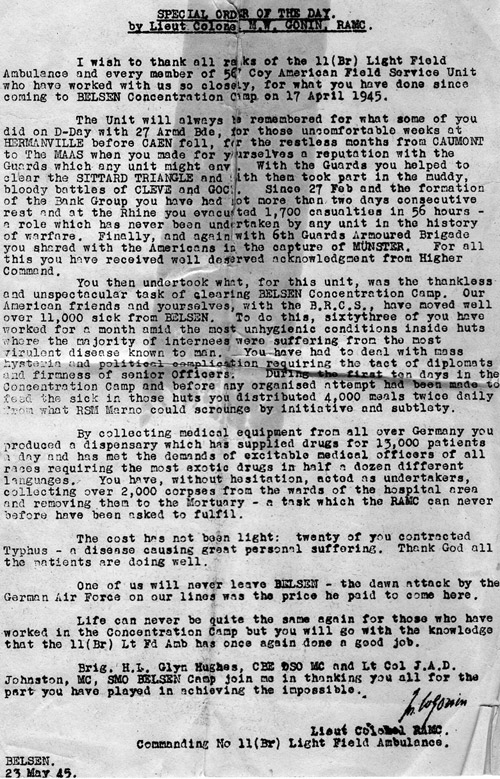Colonel Gonin's order of the day 23 May 1945
(Many thanks to Mark Liddell for supplying this document) Partial Transcript..
'The unit will always be remembered for what some of you did on D-Day with 27 Armd Bde. For those uncomfortable weeks at Hermanville before Caen fell. For the restless months from Coumont to Maas, when you made yourselves a reputation with the guards that any unit might envy. With the guards you helped to clear the Sittard Triangle and with them took part in the muddy bloodless battles of Cleave and Goch. Since 27 Feb and the formation of the Bank Group, you have not had more than two days' consecutive rest, and at the Rhine you evacuated 1,700 casualties in 56 hours, a role which has never been undertaken by any unit in the history of warfare. Finally, and again with the 6th Guards Armoured Brigade, you shared with the Americans in the capture of Munster. For all this you have received well-deserved acknowledgement from higher command.
You then undertook what for this unit was the thankless and unspectacular task of clearing Belsen Concentration Camp. Our American friends and yourselves, with the BRCS, have moved over 11,000 sick from Belsen. To do this, 63 of you have worked for a month amid the most unhygienic conditions inside huts where the majority of internees were suffering from the most virulent disease know to man. You have had to deal with mass hysteria and political complication, requiring the tact of diplomats and firmness of senior officers. During the first ten days in the concentration camp, and before an organised attempt had been made to load the sick in those huts, you distributed 4,000 meals, twice daily, from what RSM Marne could scrounge by initiative and subtlety.
By collecting medical equipment from all over Germany, you produced a dispensary, which has supplied drugs for 13,000 patients a day, and has met the demands of exitable [sic] medical officers of all races, requiring the most exotic drugs in half a dozen different languages. You have, without hesitation, acted as undertakers, collecting over 2,000 corpses from the wards of the hospital area and removing them to the mortuary — a task which the RAMC can never before have been asked to fulfil.
The cost has not been light: twenty of you contacted Typhus-A disease, causing great personal suffering. Thank God, all the patients are doing well.
One of us will never leave Belsen — a dawn attack by the German Air Force on our lines was the price he paid to come here.
Life can never be quite the same again for those who have worked in the concentration camp, but you will go with the knowledge that the 11 (BR) LT FD Amb has done a good job.
Brig HI Glyn Hughes, CBE DSO MC, and Lt Col JAD Johnston, MC, SMO, Belsen Camp, join me in thanking you all for the part you have played in achieving the impossible.
Lieut Col MW Gronin RAMC, commanding No. 11 (BR) Light Field Ambulance' |